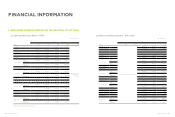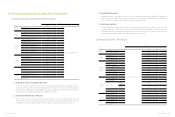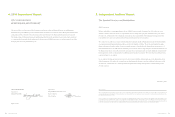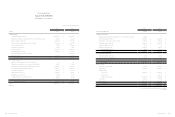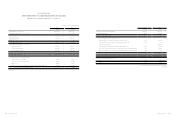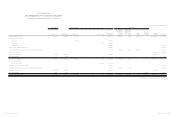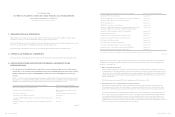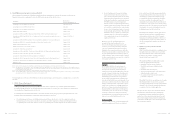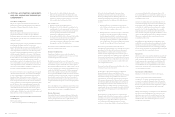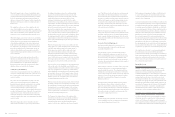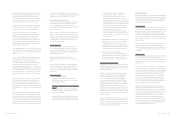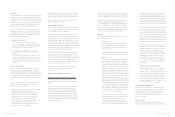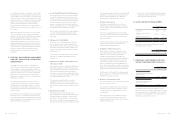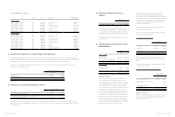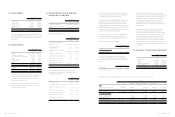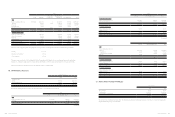HTC 2014 Annual Report Download - page 93
Download and view the complete annual report
Please find page 93 of the 2014 HTC annual report below. You can navigate through the pages in the report by either clicking on the pages listed below, or by using the keyword search tool below to find specific information within the annual report.
• Financial information Financial information •
182 183
HTC CORPORATION
NOTES TO PARENT COMPANY ONLY FINANCIAL STATEMENTS
YEARS ENDED DECEMBER 31, 2014 AND 2013
(In Thousands of New Taiwan Dollars, Unless Stated Otherwise)
1. ORGANIZATION AND OPERATIONS
HTC Corporation (the “Company”) was incorporated on May 15, 1997 under the Company Law of the Republic of China to design,
manufacture, assemble, process, and sell smart mobile devices and provide after-sales service.
In March 2002, the Company had its stock listed on the Taiwan Stock Exchange. On November 19, 2003, the Company listed some of its
shares of stock on the Luxembourg Stock Exchange in the form of global depositary receipts.
The parent company only financial statements are presented in the Company’s functional currency, New Taiwan dollars.
2. APPROVAL OF FINANCIAL STATEMENTS
The parent company only financial statements were approved by the board of directors and authorized for issue on February 6, 2015.
3. APPLICATION OF NEW AND REVISED STANDARDS, AMENDMENTS AND
INTERPRETATIONS
a. The amendments to the Guidelines Governing the Preparation of Financial Reports by Securities Issuers
and the 2013 version of the International Financial Reporting Standards (IFRS), International Accounting
Standards (IAS), Interpretations of IFRS (IFRIC), and Interpretations of IAS (SIC) in issue but not yet
effective.
Rule No. 1030010325 issued by the Financial Supervisory Commission (FSC) on April 3, 2014, stipulated that the Company should
apply the 2013 version of IFRS, IAS, IFRIC and SIC (collectively, the “IFRSs”) endorsed by the FSC and the related amendments to
the Guidelines Governing the Preparation of Financial Reports by Securities Issuers starting January 1, 2015.
New, Amended and Revised Standards and Interpretations (the “New IFRSs”) Effective Date Announced by IASB (Note)
Improvements to IFRSs (2009) - amendment to IAS 39 January 1, 2009 and January 1, 2010, as appropriate
Amendment to IAS 39 “Embedded Derivatives”Effective for annual periods ending on or after
June 30, 2009
Improvements to IFRSs (2010) July 1, 2010 and January 1, 2011, as appropriate
Annual Improvements to IFRSs 2009-2011 Cycle January 1, 2013
Amendment to IFRS 1 “Limited Exemption from Comparative IFRS 7 Disclosures for First-
time Adopters”
July 1, 2010
Amendment to IFRS 1 “Severe Hyperinflation and Removal of Fixed Dates for First-time
Adopters”
July 1, 2011
New, Amended and Revised Standards and Interpretations (the “New IFRSs”) Effective Date Announced by IASB (Note)
Amendment to IFRS 1 “Government Loans”January 1, 2013
Amendment to IFRS 7 “Disclosure - Offsetting Financial Assets and Financial Liabilities”January 1, 2013
Amendment to IFRS 7 “Disclosure - Transfer of Financial Assets”July 1, 2011
IFRS 11 “Joint Arrangements”January 1, 2013
IFRS 12 “Disclosure of Interests in Other Entities”January 1, 2013
Amendments to IFRS 10, IFRS 11 and IFRS 12 “Consolidated Financial Statements, Joint
Arrangements and Disclosure of Interests in Other Entities: Transition Guidance”
January 1, 2013
Amendments to IFRS 10 and IFRS 12 and IAS 27 “Investment Entities”January 1, 2014
IFRS 13 “Fair Value Measurement”January 1, 2013
Amendment to IAS 1 “Presentation of Other Comprehensive Income”July 1, 2012
Amendment to IAS 12 “Deferred Tax: Recovery of Underlying Assets”January 1, 2012
IAS 19 (Revised 2011) “Employee Benefits”January 1, 2013
IAS 27 (Revised 2011) “Separate Financial Statements”January 1, 2013
IAS 28 (Revised 2011) “Investments in Associates and Joint Ventures”January 1, 2013
Amendment to IAS 32 “Offsetting Financial Assets and Financial Liabilities”January 1, 2014
IFRIC 20 “Stripping Costs in Production Phase of a Surface Mine”January 1, 2013
Note: Unless stated otherwise, the above New IFRSs are effective for annual periods beginning on or after the respective effective dates.
(Concluded)
Except for the following, whenever applied, the initial application of the above 2013 IFRSs version and the related amendments to
the Guidelines Governing the Preparation of Financial Reports by Securities Issuers would not have any material impact on the
Company’s accounting policies:
1. IFRS 13 “Fair Value Measurement”
IFRS 13 establishes a single source of guidance for fair value measurements. It defines fair value, establishes a framework for
measuring fair value, and requires disclosures about fair value measurements. The disclosure requirements in IFRS 13 are more
extensive than those required in the current standards. For example, quantitative and qualitative disclosures based on the three-
level fair value hierarchy currently required for financial instruments only will be extended by IFRS 13 to cover all assets and
liabilities within its scope.
The fair value measurements under IFRS 13 will be applied prospectively from January 1, 2015.
2. Amendment to IAS 1 “Presentation of Other Comprehensive Income”
The amendment to IAS 1 requires items of other comprehensive income to be grouped into those items that (1) will not be
reclassified subsequently to profit or loss; and (2) may be reclassified subsequently to profit or loss. Income taxes on related
items of other comprehensive income are grouped on the same basis. Under current IAS 1, there were no such requirements.
The Company will apply the above amendments in presenting the statement of comprehensive income, starting from the year
2015. Items not expected to be reclassified to profit or loss are remeasurements of the defined benefit plans and actuarial gain
(loss) arising from defined benefit plans. Items expected to be reclassified to profit or loss are the exchange differences on
translating foreign operations, unrealized gain (loss) on available-for-sale financial assets and cash flow hedges. However, the
application of the above amendments will not result in any impact on the net profit for the year, other comprehensive income for
the year (net of income tax), and total comprehensive income for the year.
(Continued)


